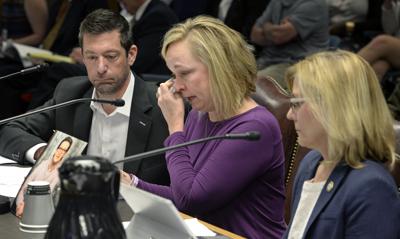The death of Southern University junior Caleb Wilson is being investigated as a hazing incident, according to authorities.
Sources close to the investigation say Wilson and several other Omega Psi Phi fraternity pledges were being punched by a group of about 10 fraternity members at a warehouse Feb. 27. They say Wilson had a medical episode during the hazing ritual, but fraternity members did not call 9-1-1 and time passed before he was taken to the hospital.Â
In Louisiana, hazing can be a felony under the Max Gruver Act, passed in 2018 and named after an LSU Phi Delta Theta fraternity member who died in  In Gruver's case, a former member of his fraternity was convicted of negligent homicide in his death while two others pleaded no contest to misdemeanor hazing. The crime of felony hazing did not exist in Louisiana at the time of their arrests.
Nationally, in 2024 then-U.S. President Joe Biden signed into law . The legislation was sponsored by Republican U.S. Sen. Bill Cassidy of Louisiana and requires universities to report hazing incidents.Â
The Max Gruver Act
prohibits hazing regardless of whether the targeted person voluntarily allowed it. Violators face a $1,000 fine and six months behind bars.
If the person being hazed dies or is seriously injured, penalties increase to a $10,000 fine and five years in prison. The increased penalties also apply if hazing involves coerced alcohol consumption that leaves the victim's blood alcohol concentration at or above 0.30%.
Previously, the maximum penalty in Louisiana for hazing was 30 days in jail and a $100 fine.Â
Under the Max Gruver Act, representatives or officers of an organization can also face penalties if they knowingly fail to report hazing. If leaders fail to report hazing, the organization can face a $10,000 fine, be required to forfeit public funds and be ordered to cease operations on campus for a period of time determined by a court.Â
If an educational institution receives a report of hazing and fails to inform law enforcement, it can be fined up to $10,000.Â
LSU Police used the new laws for the first time in 2020, when they arrested a Phi Kappa Psi fraternity member on a count of felony hazing and several other misdemeanors. The Phi Kappa Psi member's arrest came after a new member of his fraternity was hospitalized with alcohol poisoning.
Louisiana hazing incidents
Louisiana became the 11th state to make hazing a felony after Gruver died of alcohol poisoning during his freshman year at LSU. The 18-year-old and his fellow Phi Delta Theta pledges were required to chug 190-proof liquor for wrong answers to questions about the fraternity or could not recite the Greek alphabet.
Former LSU student and ex-Phi Delta Theta member Matthew Naquin was convicted of negligent homicide in the case, a rare criminal conviction nationally in a hazing case.Â
Since Gruver's death, several Louisiana fraternity chapters have been kicked off campuses over hazing allegations.Â
In 2022, the University of Louisiana Lafayette suspended both its Pi Kappa Alpha ²¹²Ô»åÌýAlpha Phi Alpha Fraternity, Inc. chapters for three years following separate hazing incidents.Â
In 2024, LSU booted from its campus after three members received criminal citations under Louisiana’s anti-hazing laws.




